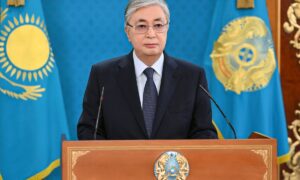Protection of human rights in the updated Constitution of Uzbekistan

Uzbekistan supports the UN Call to Action for Human Rights. Human rights occupy a central place in the ongoing reforms for political, legal and socio-economic modernization within the framework of the Uzbekistan 2030 Strategy, which is in line with the UN Sustainable Development Goals until 2030 and is aimed at ensuring the principle of “Leaving no one behind”.
In recent years, in the country, within the framework of the idea “ In the name of the honor and dignity of man,” large-scale work has been carried out to implement the National Strategy for Human Rights, in particular, to implement international standards in the field of human rights and freedoms into national legislation and the introduction of international standards in the field of human rights and freedoms into the law enforcement activities of state bodies . A clear example of this is the active work of Uzbekistan as a member of the United Nations Human Rights Council, close cooperation with the UN High Commissioner for Human Rights and special rapporteurs on human rights issues. At the initiative of Uzbekistan, three resolutions of the UN Human Rights Council on the rights of youth and children were adopted, and 4 international forums dedicated to the rights of youth were held together with international partners.
In April , a constitutional referendum was held for the first time, the cornerstone of which was ensuring human rights and interests and protecting human dignity. The new Constitution defines the priorities of Uzbekistan as a sovereign, legal, secular, democratic and social state.
The number of constitutional norms relating to human rights has increased more than 3 times and amounts to more than 50 articles. The Constitution confirms commitment to the principles of human rights, freedom of speech and conscience, equality of all citizens, regardless of their nationality, language and religion. The new Constitution of Uzbekistan enshrines such internationally recognized institutions of jurisprudence – the Miranda Rules, Habeas Corpus, Pro bone, i.e. free legal assistance.
Uzbekistan has officially banned the death penalty in the new Constitution, Article 25 clearly states: “ the death penalty is prohibited ”, thereby implementing the provisions of the Second Optional Protocol to the International Covenant on Civil and Political Rights. Uzbekistan advocates the abolition of the death penalty, including through active work at the global and regional level, in particular, at the UN Human Rights Council.
Constitutional amendments become norms of direct action, aimed, first of all, at guaranteed provision and protection of specific personal, social, economic, political, cultural and environmental rights and interests of citizens of various social strata of society.
The new Constitution guarantees the right to appeal to national and international human rights institutions. For the first time in the OSCE space, the status of national human rights institutions was secured at the constitutional level.
At the constitutional level, the institution of constitutional complaint is enshrined , i.e. the right of citizens to appeal to the Constitutional Court. A short-term Strategy for raising the judicial system to a qualitatively new level for 2023–2026 and an action program are being implemented . Measures are envisaged to further expand the institution of Habeas Corpus, introduce the institution of an investigating judge, implement the principle of self-government of judges and increase the role of the bodies of the judicial community.
Torture and other types of violence are prohibited at the constitutional level. Article 26 of the New Edition of the Constitution of the Republic of Uzbekistan establishes a prohibition of torture, violence, and other cruel, inhuman or degrading treatment or punishment. The state uses institutional and legal mechanisms to strengthen guarantees of human rights in this direction. The Nelson Mandela Rules have been implemented into legislation and practice.
According to the recommendations of the statutory bodies and treaty committees of the UN, a National Preventive Mechanism was created based on the “Ombudsman Plus” model. The Children’s Ombudsman, the National Center for Human Rights and the Business Ombudsman are also vested with the authority to monitor penitentiary institutions. Amendments have been made to the Civil Code to provide for the procedure for compensation for harm caused to victims of torture, which will make it possible to provide social, legal, psychological and medical assistance to victims of torture.
The implementation of international human rights standards, especially the protection of the rights of women, children, youth and persons with disabilities, as well as the principles of social justice, have been given constitutional status. The Constitution of Uzbekistan in the new chapter “Family, children and youth” guarantees the protection of personal, political, economic rights of young people , as well as providing them with equal opportunities for development and self-realization. A separate article guarantees the right of talented youth to receive higher education at the expense of the state.
Since 2019, Uzbekistan has implemented five Mehr humanitarian operations to return compatriots from armed conflict zones. Uzbekistan has repatriated 531 people, mostly women and children, from Syria, Iraq and Afghanistan. The government has taken comprehensive measures to rehabilitate and reintegrate repatriates into society, prevent stigmatization, ensure access to educational, social programs and employment, and improve living conditions.
In June 2023, at the UN headquarters, the international community heard first-hand the stories of repatriates who, having returned to Uzbekistan, began a new life. Uzbekistan’s model for the repatriation of compatriots, based on international law and principles of cooperation with international partners, can serve as best practices for repatriation, ensuring the best interests of the child and the full reintegration of women returning from conflict zones.
Supporting the call of the UN Secretary-General for the Global Campaign to End Statelessness “#IBelong”, the Government of Uzbekistan has taken concrete steps towards the practical implementation of this important initiative. Since 2016, more than 80 thousand stateless persons have received Uzbek citizenship.
One of the most important priorities of the state policy of Uzbekistan is the development of a culture of tolerance and humanism, strengthening interethnic, interfaith and civil harmony in society. Article 19 of the Constitution guarantees equal rights and freedoms and equality before the law without distinction of race, nationality, language and religion, as well as other grounds.
The national legal system of Uzbekistan contains serious penalties for violating the equality of citizens. The legislation provides ample opportunities to create conditions for ethnic groups to use their languages in life, preserve and develop their culture, customs and traditions. The Concept of state policy of the Republic of Uzbekistan in the field of interethnic relations is being implemented . The “Day of Friendship of Peoples” and the badge “Friendship of Peoples” were established. “Houses of Friendship” have been created, where more than 150 national cultural centers are located free of charge.
In Uzbekistan, television and radio programs are broadcast in 12 languages , newspapers and magazines are published in more than 10 languages . About 20% of secondary schools in the country provide instruction in 7 languages (Uzbek, Karakalpak, Russian, Tajik, Turkmen, Kyrgyz and Kazakh). General, vocational, secondary specialized and higher education is provided in the state language, as well as in other languages.
Issues of cooperation with business structures on human rights issues are important. The country has a Business Ombudsman, an Entrepreneurs’ Day and a constant dialogue with business representatives, and a draft Entrepreneurial Code has been developed. Work is underway to adopt the National Action Plan “Business and Human Rights”.
We can state that Uzbekistan consistently ensures the implementation of international human rights standards in national legislation and law enforcement practice. Gender, human rights and anti-corruption examination of regulatory legal acts and their projects is carried out.
The country is actively implementing the Concept for Improving Law-Making Activities ; in particular, the process of developing and adopting normative legal acts has been digitized. Over the past 5 years, a unified electronic system for the development and approval of draft regulatory legal acts (Project.gov.uz), a unified electronic system for the development, coordination and registration of decisions of local executive authorities (E-qaror), a portal for discussing draft regulatory legal acts ( http://regulation.gov.uz).
Uzbekistan recognizes that human rights education is fundamental to promoting universal respect and widespread observance of human rights. The government actively participates in the UN World Program for Human Rights Education.
The country is implementing a National Human Rights Education Program. Starting from the 2023/2024 academic year, educational and special courses “Human Rights”, “Women’s Rights”, “Child’s Rights” are being introduced in the system of vocational and higher education. Training courses are being opened on the rights of persons with disabilities, women, children and migrants. A series of manuals and brochures on human rights are published on an ongoing basis, and an Electronic Platform for Human Rights Education has been launched.
It is significant that the upcoming Fifth Phase of the World Program for Human Rights Education is once again targeting young people, expanding its scope to children, and including digital technologies, climate change and gender. All these questions were proposed during the Global Forum on Human Rights Education in December 2022 in Samarkand.
Uzbekistan began active participation in the international campaign to celebrate the 75th anniversary of the adoption of the Universal Declaration of Human Rights . As part of this initiative, a program of events is being implemented to mark the widespread celebration of this anniversary. As part of the national program for the widespread celebration of the 75th anniversary of the adoption of the Universal Declaration of Human Rights, events have been organized aimed at strengthening the rights of youth and increasing their awareness of universal human rights, as well as the active involvement of the younger generation in mastering and understanding the fundamental values of freedom, equality and justice.
Together with the UN OHCHR, an international forum “Youth Rights: Opportunities and Protection Mechanisms ” was held with the participation of youth from Central Asian countries and a Central Asian Declaration was adopted, which will be presented at a high-level event within the framework of the Human Rights 75 initiative in Geneva in December 2023 of the year.


